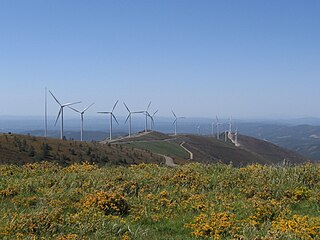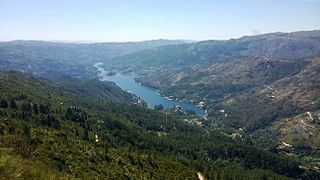
Renewable energy plays an important and growing role in the energy system of the European Union. The share of energy from renewable sources in gross final consumption of energy was 17% in 2016. This is double the share in 2004 with 8.5%. The Europe 2020 strategy includes a target of reaching 20% of gross final energy consumption from renewable sources by 2020, and at least 27% by 2030. These figures are based on energy use in all its forms across all three main sectors, the heating and cooling sector, the electricity sector and the transport sector.

CPFL Energia is the second largest non state-owned group of electric energy generation and distribution in Brazil and the third biggest Brazilian electric utility company, after Eletrobras and Energisa. The corporation is composed by CPFL Brasil, CPFL Piratininga, CPFL Paulista, CPFL Geração, CPFL Renováveis, Rio Grande Energia (RGE) and SEMESA. Each of these companies operates as a holding company that owns dozens of other companies. Its headquarters are located in Campinas, the third largest city in state of São Paulo.
Renewable energy in Portugal was the source for 25.7% of energy consumption in 2013. In 2014, 27% of Portugal's energy needs were supplied by renewable sources. In 2016, 28% of final energy consumption in Portugal came from renewable sources, an increase against the previous year (27%).

Wind power is a major source of electricity in Portugal. As of December 2013, wind power capacity in Portugal was 4,731 MW. Wind share of total electricity consumption was 23% saving nearly 8,182,900 tonnes of carbon dioxide emissions.

ENGIE is a French multinational electric utility company, headquartered in La Défense, Courbevoie, which operates in the fields of energy transition, electricity generation and distribution, natural gas, nuclear, renewable energy and Petroleum.
EDP Renewables North America and its subsidiaries develop, construct, own, and operate wind farms and solar parks throughout North America.

EDP Renováveis is a leading renewable energy company registered in Oviedo and headquartered in Madrid that designs, develops, manages and operates power plants that generate electricity using renewable energy sources.
The EDP Peştera Wind Farm is located in Peștera a commune in the Constanţa County of Dobruja. Costing €200 million, the wind farm consists of 30 three-bladed Danish wind turbines, each capable of generating 3 megawatts (MW) of power, giving a total output of 90 MW. The EDP Peştera Wind Farm is the sister project of the EDP Cernavodă Wind Farm, a 138 MW wind farm located 10 kilometres (6.2 mi) west of the Peştera farm close to the Cernavodă Nuclear Power Plant and the Danube – Black Sea Canal.

Manuel António Gomes de Almeida de Pinho is a Portuguese former Minister of Economy and Innovation (2005–09) who was indicted in 2017 and re-indicted in 2019 on multiple charges of passive corruption and money laundering for having improperly benefited, while he was in office, Portugal’s EDP-Energias de Portugal electricity company by at least 1.2 billion euros in exchange for at least 4.5 million euros in compensation to him in the form of secret monthly payments from his former employer the Espírito Santo Financial Group into offshore accounts in Pinho and his wife's names; and payments by EDP-Energias de Portugal to Columbia University to hire Pinho after he left government.

Tejo Power Station is a cultural centre that presents the evolution of energy with a Museum of Science and Industrial Archaeology concept, where themed and experimental exhibits live side by side with a great variety of cultural events. Located in the Belém area on terrain Lisbon usurped from the Tagus river at the end of the 19th century, in one of the city's areas with the greatest concentration of historical monuments where one can find, among others, the Jerónimos Monastery, the Belém Cultural Centre, the Tower of Belém, the Padrão dos Descobrimentos, the Portuguese Presidential Palace and Museum, the Coach Museum or the Cordoaria Nacional . A building classified as a Public Interest Project, the Electricity Museum unfolds along the perimeter of the old thermoelectric plant – the Tejo Power Station, which illuminated the city of Lisbon for more than four decades.
The EDP Cernavodă Wind Farm is located in Cernavodă, Constanţa County, Romania. It has 46 individual wind turbines with a nominal output of around 3 MW which delivers up to 138 MW of power, enough to power over 85,000 homes, which required a capital investment of approximately €200 million. The project was undertaken and commissioned between 2010 and May 2011. The substation control system is based on ABB MicroSCADA Pro technology using LON and DNP protocol communication with field equipment and IEC104 with two dispatch centres situated in Oporto, Portugal and Bucharest, Romania|. The control and protection system was designed and engineered by Spanish company GEDLux Sistemas de Control. The EDP Cernavodă Wind Farm is the sister project of the EDP Peştera Wind Farm, a 90 MW wind farm which is currently operating and located 10 kilometres (6.2 mi) east of the Cernavodă farm close to the Cernavodă Nuclear Power Plant and the Danube – Black Sea Canal.
The China Three Gorges Corporation is a Chinese state-owned power company, established on 27 September 1993. The company was responsible for construction of the Three Gorges Dam-project, the world largest hydroelectric power plant, that went into operation in 2008. In September 2002, CTG established the subsidiary company China Yangtze Power, which took over operations and management of Gezhouba and Three Gorges dams. CTG is one of the world's largest energy companies with total assets of RMB 475.5 billion in 2014.

Picote Dam is a concrete arch dam on the Douro, located in the municipality Miranda do Douro, in Bragança District, Portugal.

Bemposta Dam is a concrete arch dam on the Douro, where the river forms the national border line between Spain and Portugal. It is located in the municipality Mogadouro, in Bragança District, Portugal.

Bouçã Dam is a concrete double curvature arch dam on the Zêzere River, where the river forms the border line between the districts of Castelo Branco and Leiria. It is located in the municipality Pedrógão Grande, in Leiria District, Portugal.

The Caniçada Dam is a concrete arch dam on the Cávado River, the civil parish of Parada do Bouro, in the municipality of Vieira do Minho, in the Portuguese Norte (district of Braga. It is owned by Companhia Portuguesa de Produção de Electricidade.

Pocinho Dam is a concrete gravity dam on the Douro, where the river forms the border line between the districts of Guarda and Bragança. It is located in the municipality Vila Nova de Foz Côa, in Guarda District, Portugal.
Roberto Sahade is a Brazilian business man, founder of GMR Energia group, a family corporation, with investments in power generation in Latin America, mainly Brazil, Chile and Perú.

The Museum of Art, Architecture and Technology (MAAT) is a museum in Lisbon, Portugal.














